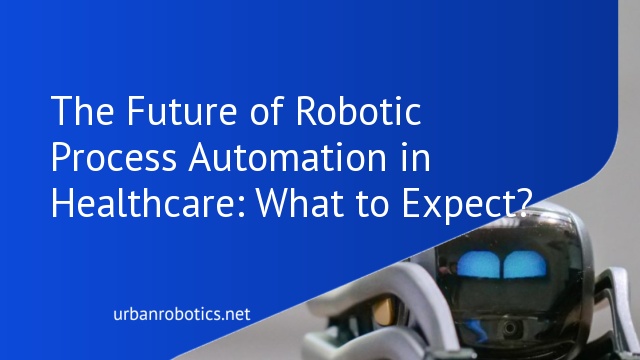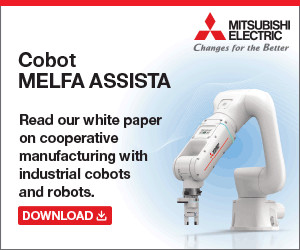The healthcare industry is on the brink of a technological revolution. With advancements in Robotic Process Automation (RPA) and Artificial Intelligence (AI), we can expect significant improvements in the way healthcare is delivered. From optimizing administrative processes to enhancing patient care, the future of RPA and AI in healthcare holds immense potential.
Efficiency will be a key focus in the future of healthcare. RPA will automate repetitive tasks, freeing up valuable time for healthcare professionals to focus on patient care. Administrative processes will be streamlined, resulting in increased efficiency and cost savings.
AI will play a crucial role in optimizing healthcare delivery. Through machine learning algorithms, AI can analyze vast amounts of medical data to improve diagnosis and treatment. This will lead to more accurate and personalized care for patients, ultimately improving patient outcomes.
The future of RPA and AI in healthcare is not limited to administrative functions and patient care. These technologies have the potential to revolutionize drug discovery and development, bringing about advancements in precision medicine.
As we look ahead, it is clear that the intersection of RPA and AI with healthcare will reshape the industry. By embracing these advancements, we can optimize efficiency, improve patient care, and pave the way for a brighter future in healthcare.
Current State of AI and RPA in Healthcare
In the current state of healthcare, both AI and RPA technologies are playing a significant role in improving various aspects of the industry. AI is being utilized for diagnosis, treatment, drug development, clinical trials, and patient engagement. On the other hand, RPA is primarily employed for administrative functions such as patient registration, scheduling, billing, claims processing, and medical coding.
AI in healthcare is transforming the way diseases are diagnosed and treated. With machine learning algorithms, AI can analyze large volumes of medical data to identify patterns and predict outcomes. This has the potential to enhance diagnostic accuracy and enable personalized treatment plans based on individual patient data. Moreover, AI-powered chatbots and virtual assistants are revolutionizing patient engagement by providing real-time communication and personalized health recommendations.
RPA, on the other hand, is streamlining administrative processes in healthcare. By automating repetitive tasks, it improves efficiency and accuracy while reducing errors and costs. Administrative functions like patient registration and billing are becoming more efficient and streamlined, allowing healthcare providers to focus more on patient care.
Current State of AI and RPA in Administrative Functions
| Administrative Functions | AI | RPA |
|---|---|---|
| Patient Registration | AI-powered chatbots can assist patients in the registration process, guiding them through the required information and ensuring accurate data entry. | RPA can automate the entire patient registration process, including data entry, verification, and integration with electronic health record systems. |
| Billing | AI can analyze medical codes and patient records to generate accurate and optimized bills, reducing errors and improving revenue cycles. | RPA can automate billing processes, including claims processing, ensuring accurate coding, submission, and reimbursement. |
| Claims Processing | AI can analyze claims data to identify fraudulent or erroneous claims, improving accuracy and reducing costs. | RPA can automate claims processing, reducing manual errors and improving efficiency in claim adjudication and reimbursement. |
The current state of AI and RPA in healthcare demonstrates their immense potential to enhance efficiency, accuracy, and patient satisfaction. As technology continues to advance, we can expect even greater integration and utilization of these technologies in various aspects of healthcare, ultimately leading to improved patient outcomes and a more optimized healthcare system.
Future of AI and RPA in Healthcare
In the future, the integration of Artificial Intelligence (AI) and Robotic Process Automation (RPA) in healthcare will bring about significant advancements in diagnosis, treatment, patient engagement, and administrative processes. AI-powered machine learning algorithms will enable healthcare providers to analyze vast amounts of medical data, identifying patterns and predicting outcomes with unprecedented accuracy. This will revolutionize the way diseases are diagnosed and treated, leading to personalized treatment plans based on individual patient data. Patient engagement will be enhanced through the use of AI-driven chatbots and virtual assistants, providing real-time communication and personalized health recommendations.
RPA, on the other hand, will streamline administrative processes by automating repetitive tasks, reducing errors, and improving resource allocation. This will free up valuable time for healthcare professionals to focus on delivering quality patient care. Additionally, AI will play a pivotal role in drug discovery and development, leveraging data analysis to identify potential drug candidates and optimize treatment plans based on individual patient data.
Advancements in Diagnosis and Treatment
By harnessing the power of AI, healthcare providers will be equipped with advanced diagnostic tools that can detect diseases at an early stage. This will enable early intervention and increase the chances of successful treatment outcomes. Furthermore, AI algorithms will continuously learn and adapt from new data, improving diagnostic accuracy and reducing medical errors. These advancements will ultimately lead to better patient outcomes and improved quality of care.
Moreover, AI-powered treatment plans will be tailored to individual patients, taking into account their unique characteristics and medical history. This personalized approach will optimize treatment effectiveness and minimize side effects, providing patients with the best possible care. The integration of AI and RPA in healthcare will revolutionize the field, ushering in a new era of precision medicine and transforming the way healthcare is delivered.
| Advancements in AI and RPA in Healthcare | Benefits |
|---|---|
| Enhanced diagnosis and treatment through AI-powered machine learning algorithms | Improved accuracy, early disease detection, personalized treatment plans |
| Streamlined administrative processes through RPA automation | Reduced errors, improved resource allocation, increased efficiency |
| AI-driven drug discovery and development | Identification of potential drug candidates, optimized treatment plans |
In conclusion, the future of AI and RPA in healthcare holds great promise. These technologies will greatly enhance diagnosis and treatment, patient engagement, and administrative processes. With the power of AI and RPA, healthcare providers will be able to deliver more accurate and personalized care, leading to improved patient outcomes. The integration of these technologies will revolutionize the healthcare industry, ushering in a new era of efficiency, effectiveness, and patient-centered care.
Benefits of AI and RPA in Healthcare
AI and RPA technologies have brought numerous benefits to the healthcare industry, improving efficiency, accuracy, cost savings, and patient satisfaction. Let’s explore some of these benefits:
Enhanced Efficiency:
AI and RPA streamline administrative processes by automating repetitive tasks such as patient registration, scheduling, billing, claims processing, and medical coding. This automation reduces manual errors and frees up valuable time for healthcare professionals to focus on patient care.
Improved Accuracy:
AI-powered diagnostic tools analyze large amounts of medical data to identify patterns and predict outcomes, leading to more accurate diagnosis and treatment plans. This not only improves patient outcomes but also reduces the occurrence of medical errors.
Cost Savings:
By automating administrative tasks and reducing the occurrence of errors, AI and RPA technologies contribute to significant cost savings in healthcare operations. These technologies optimize resource allocation and minimize unnecessary expenditures.
Enhanced Patient Satisfaction:
AI-powered chatbots and virtual assistants provide real-time communication and personalized health recommendations to patients, enhancing engagement and satisfaction. Patients can have their questions answered promptly and receive personalized care, leading to a better overall healthcare experience.
| Benefits | AI | RPA |
|---|---|---|
| Efficiency | Streamlines administrative processes | Automates repetitive tasks |
| Accuracy | Improves diagnostic accuracy and treatment plans | Reduces errors in administrative tasks |
| Cost Savings | Optimizes resource allocation | Minimizes unnecessary expenditures |
| Patient Satisfaction | Enhances patient engagement and personalized care | N/A |
Challenges of AI and RPA in Healthcare
As promising as the future of AI and RPA in healthcare may be, there are several challenges that need to be addressed for successful implementation. One of the key challenges is data interoperability. Healthcare systems often rely on multiple sources of data that may not be compatible with each other. This can hinder the seamless flow of information and impact the accuracy of AI algorithms and RPA processes.
Another significant challenge is ensuring regulatory compliance. Healthcare is a highly regulated industry with strict privacy and security requirements. Adhering to these regulations while leveraging AI and RPA technologies can be complex and requires careful planning and implementation. Healthcare organizations need to ensure that their AI and RPA solutions meet all necessary regulatory standards to protect patient data and maintain compliance.
Adoption and trust are also major challenges in the healthcare industry. AI and RPA technologies are still relatively new in healthcare, and there may be resistance or hesitancy from healthcare professionals and patients. Building trust and overcoming skepticism around these technologies will be essential for their successful adoption. Addressing concerns about job displacement and clarifying ethical considerations will also play a crucial role in gaining acceptance and support for AI and RPA in healthcare.
| Challenges | Impact |
|---|---|
| Data Interoperability | Hinders seamless flow of information |
| Regulatory Compliance | Complex requirements to protect patient data |
| Adoption and Trust | Resistance and skepticism from professionals and patients |
Future Innovations in AI and RPA for Healthcare
In the rapidly evolving field of healthcare, the future holds exciting possibilities for the integration of AI and RPA technologies. These innovations have the potential to revolutionize healthcare delivery and improve patient outcomes. Let’s explore some of the future innovations in AI and RPA for healthcare:
Personalized Medicine
One of the most promising applications of AI and RPA in healthcare is personalized medicine. AI algorithms can analyze vast amounts of individual patient data, including genetic information, medical history, and lifestyle factors, to provide tailored treatment plans. By considering the unique characteristics of each patient, healthcare providers can offer more effective and targeted interventions, resulting in better health outcomes.
Remote Monitoring
AI-powered devices are transforming the way healthcare providers monitor patients remotely. These devices continuously collect vital data, such as heart rate, blood pressure, and oxygen levels, and transmit this information to healthcare professionals in real-time. Through AI analysis, healthcare providers can receive alerts for any abnormalities, allowing for timely interventions and proactive care. Remote monitoring improves patient safety, reduces hospitalizations, and enhances overall healthcare management.
Precision Medicine
Precision medicine aims to optimize treatment plans based on a patient’s unique genetic makeup and other individual factors. AI and RPA play a crucial role in analyzing vast datasets to identify the most effective treatments for specific patient populations. By leveraging AI algorithms, healthcare providers can identify patterns and correlations that would be difficult to detect through traditional methods. This enables the development of tailored interventions that result in improved outcomes and reduced adverse effects.
| Future Innovations | Benefits |
|---|---|
| Personalized Medicine | – Tailored treatment plans based on individual patient data – Better health outcomes |
| Remote Monitoring | – Real-time patient monitoring – Early detection of abnormalities – Improved healthcare management |
| Precision Medicine | – Optimized treatment plans based on individual factors – Improved outcomes and reduced adverse effects |
As we look toward the future, the integration of AI and RPA in healthcare holds immense potential. From personalized medicine to remote monitoring and precision medicine, these innovations will shape the way healthcare is delivered and experienced. Embracing these technological advancements will result in better patient care, improved outcomes, and a more efficient healthcare system as a whole.
Choosing the Right AI and RPA Solutions in Healthcare
When it comes to selecting the right AI and RPA solutions for your healthcare organization, there are several key factors to consider. First and foremost, ease of use is crucial. The chosen solutions should be user-friendly, enabling healthcare professionals to seamlessly integrate them into their existing workflows without a steep learning curve.
Compatibility with your organization’s existing systems is another essential factor. You need to ensure that the AI and RPA solutions can be easily integrated into your current infrastructure, minimizing disruptions and maximizing efficiency. Scalability is also important, as your organization’s needs may evolve over time. Choosing solutions that can grow with you will save you the hassle of having to switch platforms down the line.
Vendor selection is a critical step in the process. It is crucial to choose a vendor that has a strong track record in healthcare and a deep understanding of the industry’s unique needs and regulatory requirements. In addition, consider the vendor’s ability to provide ongoing support and updates to keep your AI and RPA solutions up-to-date and well-maintained.
By carefully evaluating these factors and selecting the right AI and RPA solutions, healthcare organizations can ensure successful implementation and maximize the benefits of these technologies in their operations. The right solutions will not only improve efficiency and accuracy but also empower healthcare professionals to deliver better patient care and improve patient outcomes.





